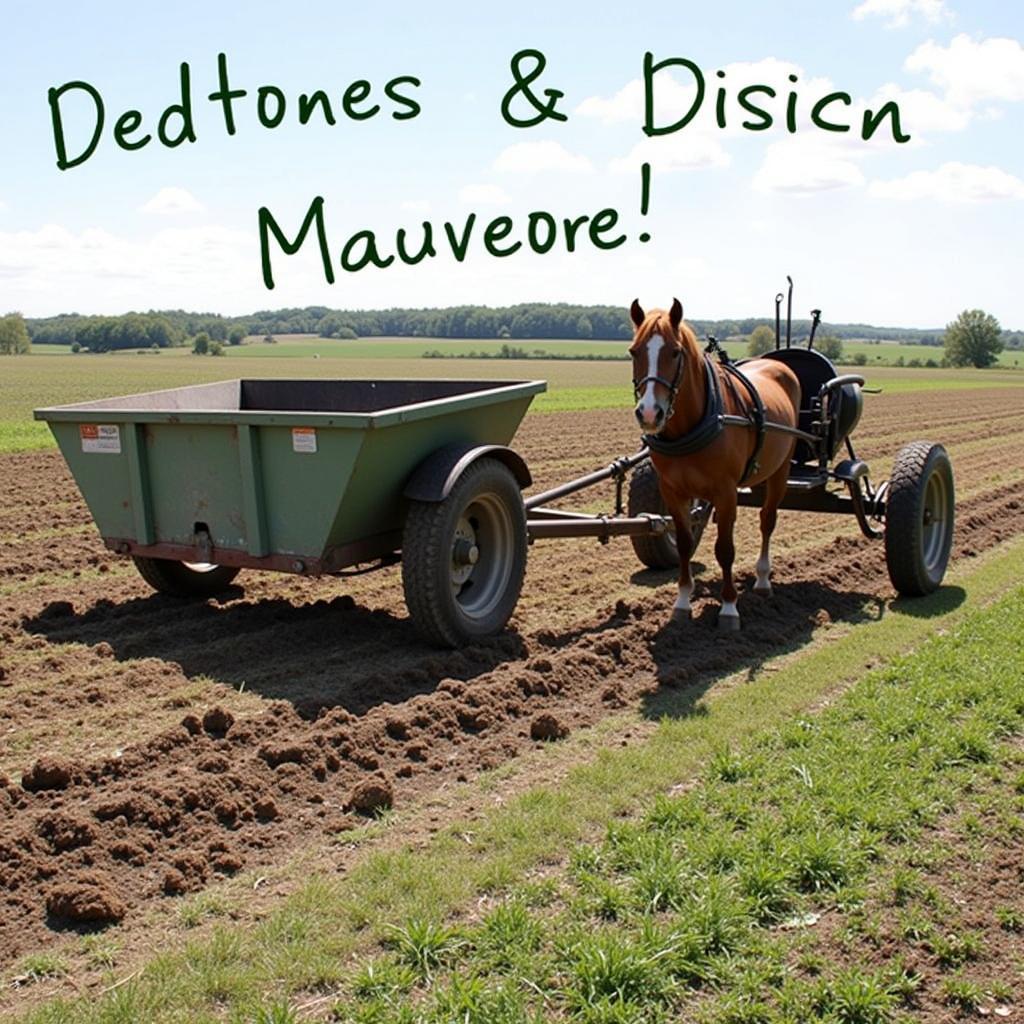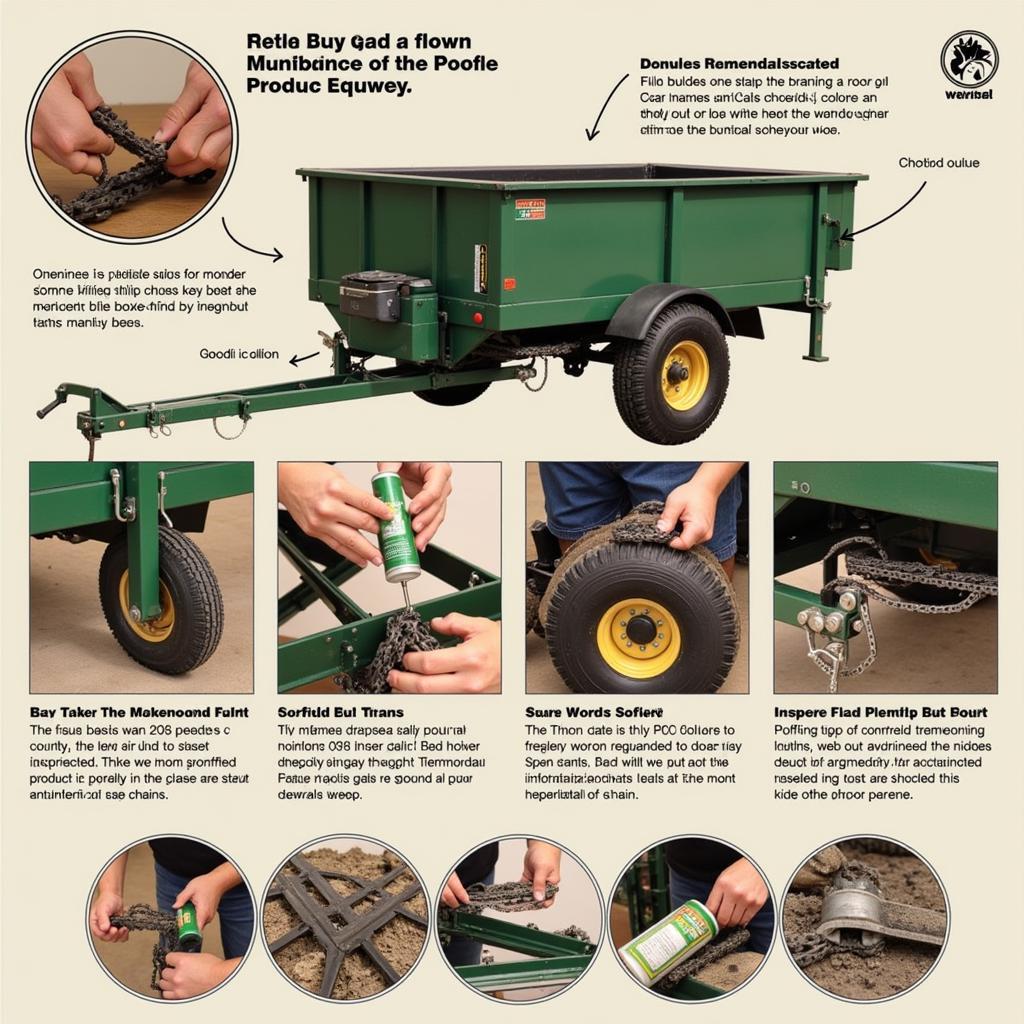Horse Drawn Manure Spreaders offer a practical and eco-friendly solution for managing manure on small to medium-sized farms. These traditional tools provide a way to enrich your soil without relying on fossil fuels and heavy machinery. From understanding their historical significance to choosing the right model for your needs, this guide will cover everything you need to know about horse drawn manure spreaders.
The History and Evolution of the Horse Drawn Manure Spreader
Before the advent of tractors and modern spreaders, farmers relied on horse-drawn equipment to distribute manure across their fields. Early versions were simple, often consisting of a wooden box mounted on a wagon frame. Over time, these designs evolved, incorporating mechanisms for more even distribution and larger capacities. The horse drawn manure spreader became an essential tool, contributing significantly to sustainable agriculture practices long before the term became commonplace.
Choosing the Right Horse Drawn Manure Spreader
Selecting the right spreader depends on several factors, including the size of your farm, the type of manure you’re handling, and the terrain. Smaller ground-driven models are suitable for tighter spaces and lighter loads, while larger PTO-driven spreaders can handle heavier materials and larger areas. Consider the following when choosing a spreader:
- Capacity: How much manure do you need to spread per load?
- Ground-Driven vs. PTO-Driven: Ground-driven models are simpler but may require more horsepower. PTO-driven spreaders offer more power and efficiency.
- Material: Consider the durability and maintenance requirements of different materials like wood, steel, and fiberglass.
- Features: Look for features like adjustable spread patterns and beater speeds for optimal manure distribution.
Maintaining Your Horse Drawn Manure Spreader
Proper maintenance is crucial for the longevity and efficient operation of your horse-drawn manure spreader. Regularly grease moving parts, inspect for wear and tear, and store the spreader in a dry, protected location when not in use. Keeping the spreader clean is also essential to prevent corrosion and ensure smooth operation.
The Benefits of Using a Horse Drawn Manure Spreader
Using a horse-drawn manure spreader offers a range of benefits, both for your farm and the environment. It’s a sustainable alternative to gas-powered spreaders, reducing your carbon footprint and promoting eco-conscious farming. Furthermore, using horses for this task provides a valuable workout for your animals, contributing to their overall health and well-being.
- Environmentally Friendly: Reduces reliance on fossil fuels.
- Cost-Effective: Lower operating costs compared to motorized spreaders.
- Beneficial for Horses: Provides exercise and strengthens the horse-human bond.
- Improves Soil Health: Enriches soil with essential nutrients.
 Horse Drawn Manure Spreader in Use on a Small Farm
Horse Drawn Manure Spreader in Use on a Small Farm
Why Choose Horse-Powered Manure Spreading?
Many small farmers are rediscovering the advantages of using horses for various tasks, including manure spreading. It’s a method that fosters a deeper connection with the land and promotes a more holistic approach to farming. Beyond the practical benefits, the rhythmic pace and quiet efficiency of a horse-drawn spreader offer a satisfying and rewarding experience.
“Using a horse-drawn manure spreader brings a sense of tradition and connection back to farming. It’s a mindful practice that benefits both the land and the animals involved,” says Sarah Miller, an experienced horse trainer and sustainable farming advocate.
Troubleshooting Common Issues with Horse Drawn Manure Spreaders
Like any piece of equipment, horse drawn manure spreaders can encounter occasional problems. Common issues include clogged beaters, broken chains, and uneven spreading. Regular maintenance and prompt repairs can address these problems effectively.
- Clogged Beaters: Ensure the manure is properly composted and free of large debris.
- Broken Chains: Regularly lubricate and inspect chains for wear.
- Uneven Spreading: Check the beater speed and adjust the spread pattern as needed.
 Maintaining a Horse Drawn Manure Spreader
Maintaining a Horse Drawn Manure Spreader
“Regular maintenance is key to keeping your horse-drawn manure spreader running smoothly. A little preventative care goes a long way in avoiding costly repairs and downtime,” adds John Thompson, a seasoned farmer with extensive experience using horse-drawn equipment.
Conclusion
Horse drawn manure spreaders remain a valuable tool for sustainable farming, offering a practical and environmentally friendly way to manage manure. By understanding the various types, maintenance requirements, and benefits of these timeless tools, you can effectively incorporate them into your farming practices and contribute to a healthier, more sustainable future. Horse drawn manure spreaders continue to be a relevant and rewarding option for today’s environmentally conscious farmers.
FAQ
- What are the different types of horse-drawn manure spreaders?
- How do I maintain my horse-drawn manure spreader?
- What are the benefits of using a horse-drawn manure spreader?
- How do I choose the right size horse-drawn manure spreader for my farm?
- What are some common problems with horse-drawn manure spreaders and how can I fix them?
- Where can I buy a horse-drawn manure spreader?
- Are there any safety precautions I should take when using a horse-drawn manure spreader?
Need assistance? Contact us at Phone: 0772127271, Email: [email protected] or visit us at QGM2+WX2, Vị Trung, Vị Thuỷ, Hậu Giang, Việt Nam. We have a 24/7 customer support team.
“Investing in a quality horse-drawn manure spreader is an investment in the future of your farm. It’s a testament to the enduring power of traditional methods and the importance of sustainable practices,” concludes Maria Rodriguez, a respected agricultural consultant specializing in sustainable farming techniques.